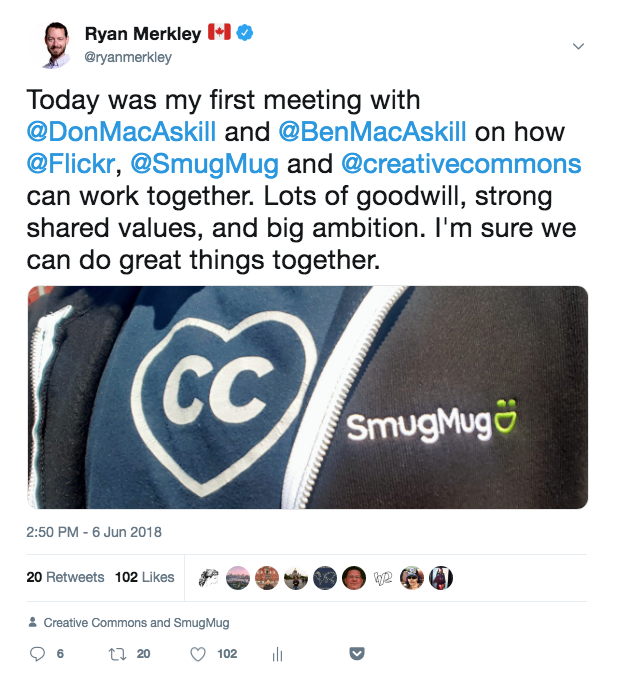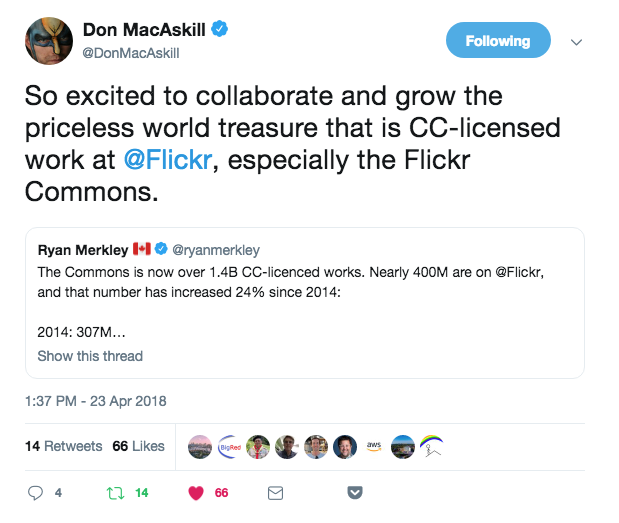EU’s proposed link tax would [still] harm Creative Commons licensors
mercredi 7 novembre 2018 à 10:00
In September the European Parliament voted to approve drastic changes to copyright law that would negatively affect creativity, freedom of expression, research, and sharing across the EU. Now the Parliament and Council (representing the Member State governments) are engaged in closed-door negotiations, and their task over the coming months is to come up with a reconciled version of the directive text, which will again be voted on in the European Parliament next year.
Article 11: The wrong solution to a real problem
A major provision that will be discussed is Article 11, the new “press publisher’s right” (also known as the link tax). Both the Parliament and Council have already approved versions of this unnecessary and counterproductive “publisher’s right,” which would require news aggregators that wish to index or incorporate links and snippets of journalistic content to first get a license or pay a fee to the publisher for their use online.
The Parliament’s version of Article 11 says Member States must adopt the new right so press publishers “may obtain fair and proportionate remuneration for the digital use of their press publications by information society service providers.”
Article 11 is ill-suited to address the challenges in supporting quality journalism, and it will further decrease competition and innovation in news delivery. Spain and Germany have already experimented with similar versions of this rule, and neither resulted in increased revenues for publishers. Instead, it likely decreased the visibility (and by extension, revenues) of published content—exactly the opposite of what was intended. Just last week a coalition of small- and medium-sized publishers sent a letter to the trilogue negotiators outlining how they will be harmed if Article 11 is adopted.
Collateral damage: those that want to share under CC
Not only is a link tax bad for business, it would undermine the intention of authors who wish to share without additional strings attached, such as creators who want to share works under open licenses. This could be especially harmful to Creative Commons licensors if it means that remuneration must be granted notwithstanding the terms of the CC license. This interpretation is not far-flung. As IGEL wrote last week,
“the Parliament’s proposal makes it clear that press publishers should receive financial compensation from search engine providers in particular when they display links to publishers’ websites. Member States, however, could now come up with the idea that this goal could be achieved most effectively if publishers could not waive their right to remuneration. Only the amount of the remuneration claim would then still be negotiable, but not its assertion.”
As we’ve said before, such a right “directly conflicts with publishers who wish to share freely and openly using Creative Commons licenses. Forcing publishers who use CC to accept additional unwaivable rights to receive payment violates the letter and spirit of Creative Commons licensing and denies publishers the freedom to conduct business and share content as they wish.”
When an author applies a Creative Commons licenses to their work, they grant to the public a worldwide, royalty-free license to use the work under certain terms. The license text specifically states, “To the extent possible, the Licensor waives any right to collect royalties from You for the exercise of the Licensed Rights, whether directly or through a collecting society under any voluntary or waivable statutory or compulsory licensing scheme.”
For example, the Spanish news site eldiario.es releases all of their content online for free under the Creative Commons Attribution-ShareAlike license. By doing so, they are granting to the public a worldwide, royalty-free license to use the work under certain terms. Other news publishers in Europe using CC licenses that could also find themselves swept up under this new provision include La Stampa, 20 Minutos, and openDemocracy. These outlets have made a conscious decision to share their works for free under Creative Commons licenses without having to jump through additional hoops of charging aggregators or search engines for displaying links and snippets to their stories. If Article 11 would be deemed an unwaivable right, would it prevent these news publishers from using CC altogether since the license would conflict with the legal requirement?
We firmly believe the author’s right to choose to share, or to seek compensation for all or some uses of their works. At the same time, the EU copyright directive must find a solution that also honors those authors who choose to share with few or no restrictions.
What can be done?
Article 11 should be deleted. Publishers already benefit greatly from the copyrights they have in their content, and don’t need an additional exclusive right to protect or exploit those rights. It’s clear that an additional right for press publishers will not support quality journalism, increase the diversity of media content, or grow the digital single market. Instead, it will negatively affect access to information and the ability for publishers to share using the platforms, technologies, and terms beneficial to them.
For years academics and public interest advocates have advocated for an easier and more effective way to promote the aims of quality journalism and the ability of press publishers to sustain their efforts without a new press publishers right. This approach was presented in the Parliament by former JURI Rapporteur Comodini, and that would rely on a presumption that publishers are the rights holders, thus making it easier for these entities “to conclude licences and to seek application of the measures, procedures and remedies.” The Parliament’s own research even recommended such an approach. This framing, which draws from Directive 2004/48/EC on the enforcement of intellectual property rights, already provides a robust legal framework for the protection of content without the negative aspects of introducing a new right.
If including some version of Article 11 is unavoidable, the Council version should be prioritised, since it already includes some protections for works under open licenses, or in the public domain. For instance, the previous Council text includes the following provision: “When a work or other subject-matter is incorporated in a press publication on the basis of a non-exclusive licence, the rights […] may not be invoked to prohibit the use by other authorised users [or] works or other subject-matter whose protection has expired.” In addition, the Council text only permits a 1 year term of protection, as opposed to the 5 year term offered by the Parliament version.
So far, the direction of the EU copyright directive reflects a disturbing path toward increasing control of the web to benefit only powerful rights holders at the expense of the open internet, freedom of expression, and the rights of users and the public interest in the digital environment. In the current negotiations, the Parliament and Council should not double down and punish Creative Commons licensors and others who want to share broadly with the world. These authors and creators have made a deliberate choice to use CC legal tools so that others may benefit. Their contributions to the commons should be respected and protected.
Authors:
Timothy Vollmer is Senior Public Policy Manager at Creative Commons.
Dr. Till Kreutzer is a lawyer, journalist, and Creative Commons Global Network Council Representative for CC Germany. He leads the Initiative Against An Ancillary Copyright For Press Publishers (“Initiative gegen ein Leistungsschutzrecht”, or IGEL).
The post EU’s proposed link tax would [still] harm Creative Commons licensors appeared first on Creative Commons.




